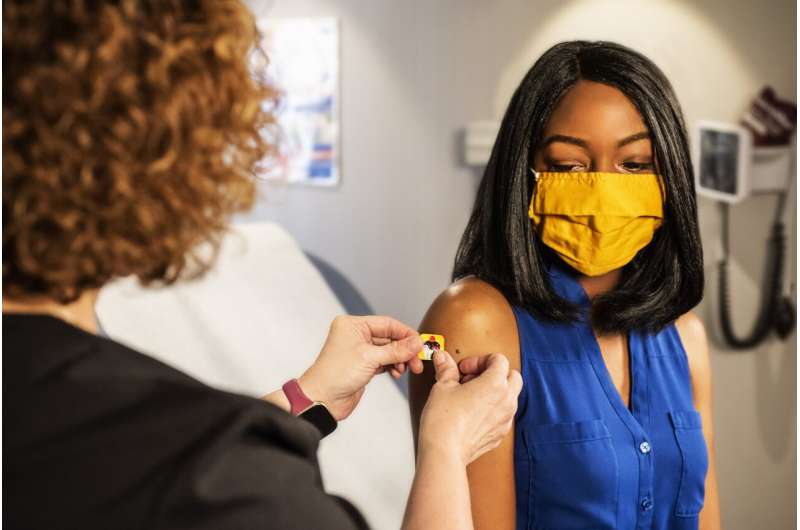
Public self-confidence in vaccines has actually plunged throughout sub-Saharan Africa because the COVID-19 pandemic, according to a research study of 17,000 individuals, throughout 8 nations, released today in the journal Human Vaccines & & Immunotherapeutics(* )The findings come as the World Health Company and UNICEF have actually reported the biggest continual fall in uptake of regular youth immunizations in 3 years. 6 million less kids in Africa got regular shots for illness consisting of tetanus, polio, diphtheria and measles over the previous 2 years, and increasing break outs threaten to reverse years of development versus avoidable illness.
To date, the fall in regular youth vaccinations was believed to be down to disturbance of vaccination programs by the pandemic– nevertheless these brand-new findings, which followed a research study performed by a group from London School of Health & & Tropical Medication (LSHTM) and the Africa Centres for Illness Control and Avoidance, recommend there might be other possible factors too.
” Our research study paints a distressing image of decreasing
vaccine self-confidence patterns throughout lots of sub-national areas in sub-Saharan Africa, especially in the Democratic Republic of Congo, where self-confidence losses are especially big,” specifies lead author Dr. Alex de Figueirido, a Research Study Fellow at LSHTM.
The group’s outcomes might be an early indication of larger scale loss in vaccine self-confidence, state the authors. Seriously, local losses in self-confidence– as seen in this research study– might result in clusters of non-vaccinated individuals which might have an unfavorable effect on ‘herd resistance’– the point at which a population is secured from an illness, either by sufficient individuals being immunized or by individuals having actually established antibodies through having the illness.
The research study included in person interviews with over 17,000 grownups (an even divided of males and females) throughout 8 sub-Saharan African nations: the Democratic Republic of Congo (DRC), Ivory Coast, Kenya, Niger, Nigeria, Senegal, South Africa and Uganda. The professionals utilized tasting techniques to guarantee a precise random sample of the population was represented and to acquire an image of vaccine self-confidence at both nationwide and local levels.
Interviewees’ age, sex, religious beliefs, work status and greatest education level were tape-recorded to assist the scientists to evaluate whether social background impacted self-confidence in vaccines. The interviews were performed in 2020 and once again in 2022, after the pandemic.
Participants were asked to state how highly they concurred with declarations such as “Vaccines are very important for any ages,” “Vaccines are very important for kids” and “Vaccines are safe.” They were likewise asked particularly about COVID-19 vaccines, ranking their contract that COVID-19 vaccines would be necessary, safe and efficient– both prior to they had actually been established (in 2020) and after that after they had actually been established and presented, in 2022.
Findings revealed a fall in individuals’s view that vaccines are very important for kids throughout all 8 nations in between 2020 and 2022, especially in DRC (20% decrease), followed by Uganda (14%) and Nigeria (10.5%). In Nigeria and DRC,
public self-confidence in vaccine security and efficiency likewise decreased, and less individuals concurred that ‘vaccines are very important for any ages’ in Ivory Coast, Kenya, Nigeria, South African and Uganda.
When it pertained to COVID-19 vaccines, individuals believed they were lesser in 2022 than they had in 2020 in 7 out of the 8 nations, with the most significant loss of rely on DRC, South Africa and Uganda. Individuals in DRC, Kenya, Niger, Senegal and Nigeria believed that the COVID-19 vaccine was less efficient in 2022 than they had actually anticipated it to be in 2020. Nevertheless, rely on the security of the COVID-19 vaccine remained constant over the 2 years.
In 2022, the over-60s were most likely than more youthful grownups to concur that vaccines are typically safe, efficient and essential for kids, however no other links were discovered in between vaccine self-confidence and sex, education, work status or spiritual association.
” Early caution signals of self-confidence losses– such as those found in this research study– can offer time to react, when it comes to other upsurges, pandemics or other emerging crises,” includes co-author, Teacher of Sociology, Danger and Choice Science Heidi Larson, who is the Establishing Director of the Vaccine Self-confidence Task at LSHTM.
” Self-confidence tracking at sub-national resolutions can likewise offer clearer signals to the areas and groups dealing with self-confidence losses and can much better prepare policymakers and stakeholders for prospective losses in vaccine uptake.”.
An extensive examination is now required to discover whether loss of self-confidence in COVID-19 vaccines will activate skepticism of other immunization programs, state the research study authors.
” Thinking about international declines in regular immunization rates over the previous 2 years, vaccine self-confidence losses might show to be extremely disruptive at this time when there are collective efforts to attend to losses in regular immunization rates post pandemic. We require to comprehend the effect of the COVID-19 pandemic on self-confidence in regular immunization programs, not simply in Africa, however throughout the world,” states Dr. Defigueirido.
” Comprehending the function of the COVID-19 pandemic and associated policies on larger
More info:
Decreasing patterns in vaccine self-confidence throughout sub-Saharan Africa: a massive cross-sectional modeling research study, Human Vaccines & & Immunotherapeutics( 2023 ). DOI: 10.1080/ 21645515.2023.2213117, www.tandfonline.com/doi/full/1 … 1645515.2023.2213117
Offered by.
:.
Self-confidence in vaccines has actually dropped in Africa because the pandemic, reveals eight-country research study (2023, June 8).
obtained 8 June 2023.
from https://medicalxpress.com/news/2023-06-confidence-vaccines-plummeted-africa-pandemic.html.
This file goes through copyright. Apart from any reasonable dealing for the function of personal research study or research study, no.
part might be recreated without the composed authorization. The material is attended to info functions just.